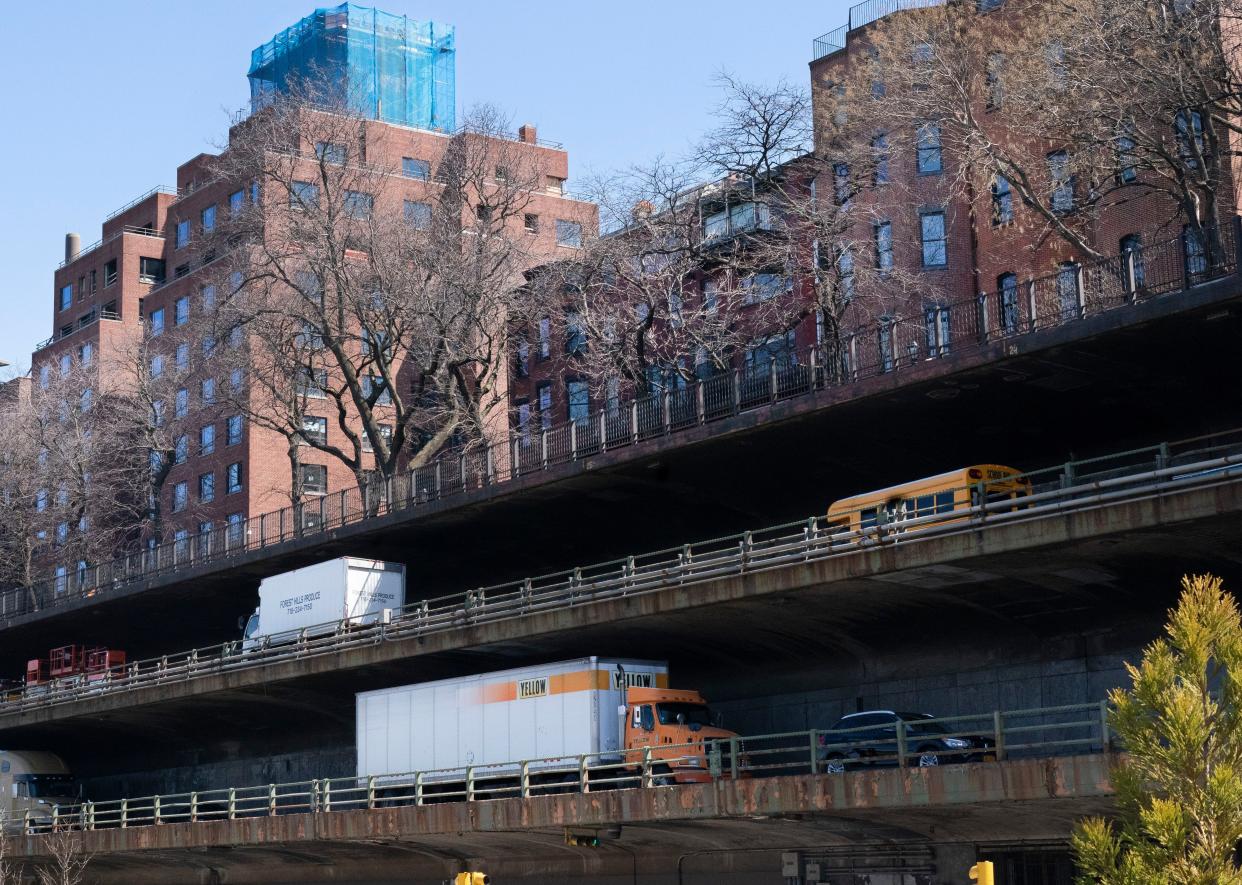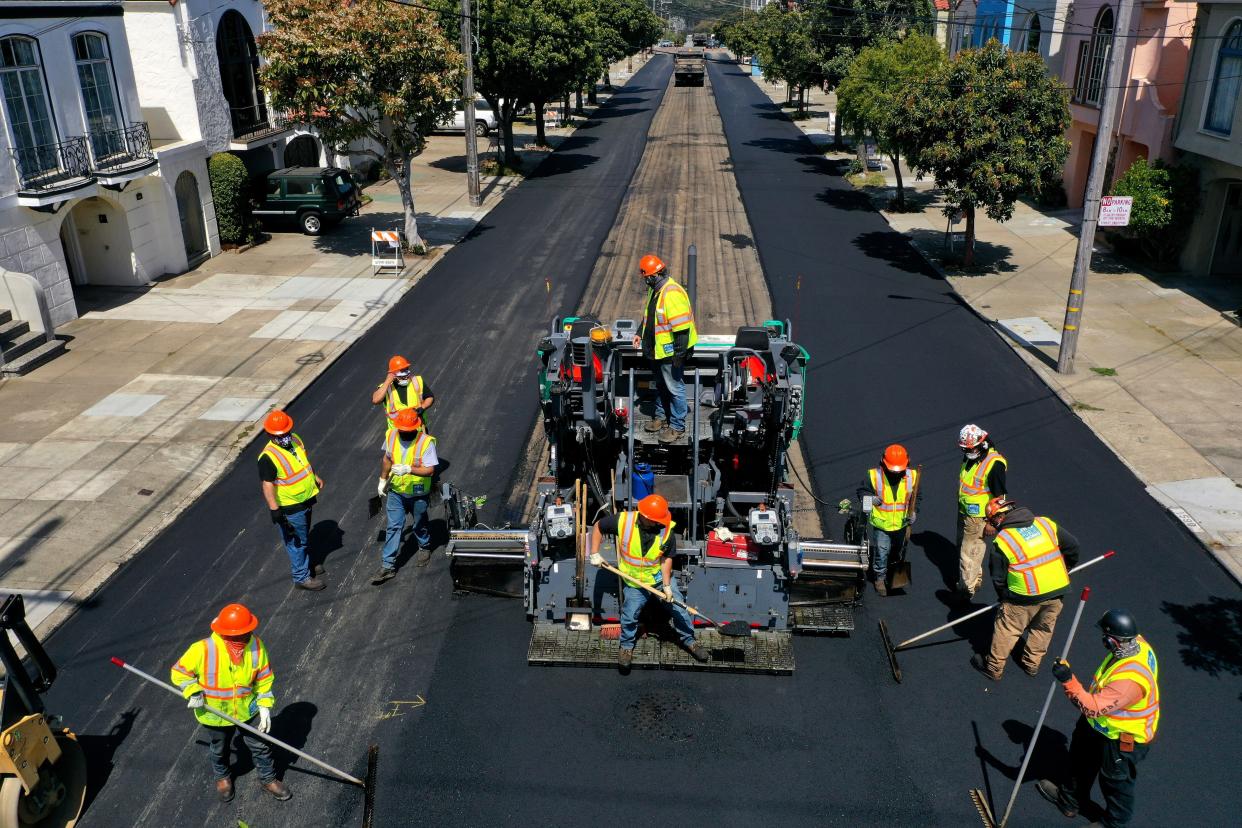Biden signals openness to negotiating with Republicans on $2T infrastructure plan
President Biden suggested Monday that he’s prepared to water down parts of his $2.3 trillion infrastructure plan if that’s what it takes to get Republicans onboard — but also affirmed that “inaction is not an option.”
Speaking ahead of a meeting with four Republican and four Democratic members of Congress, Biden told reporters he’s all ears to compromising on the substance of his infrastructure-focused “American Jobs Plan” as well as hearing out alternate proposals for how to pay for it.
“I’m prepared to negotiate,” Biden said in the Oval Office, with Vice President Kamala Harris and the bipartisan group of lawmakers seated around him.
After the meeting, which lasted nearly two hours behind closed doors, the White House released a statement stressing that Biden’s appetite for compromising with the Republicans only goes so far.
“The president and members of Congress had a good exchange of ideas, and the president asked for their feedback and follow-up on proposals discussed in the meeting, while underscoring that inaction is not an option,” the statement said.

In another sign that Biden is mostly sticking to his guns, the White House earlier in the day unveiled a state-by-state breakdown of the need for infrastructure revitalization.
The document held that every state and territory in the U.S. is in dire need of investment, including New York, which received a “C minus” infrastructure ranking from the White House.
The White House document said New York especially needs to refurbish transit systems like the MTA, with 11% of trains, buses and other public vehicles in the state being “past useful life.” The outdated services is causing New Yorkers who rely on public transit to spend an extra 58.9% of their time commuting, according to the White House.
Biden’s $2.3 trillion blueprint, one of the most sprawling economic restructuring proposals since the New Deal programs, would pour hundreds of billions of dollars into fixing crumbling transit systems, roads, bridges and other traditional modes of infrastructure across the nation, creating millions of blue-collar jobs in the process.
However, Biden’s plan would also pump hundreds of billions of dollars into more unconventional items, like expanding broadband internet access, child care and Medicaid, while also seeking to overhaul American infrastructure in a way that would bolster the fight against climate change and address racial injustice.

Biden’s big-tent definition for infrastructure — as well as his proposal to pay for the sweeping plan by hiking the corporate tax rate from 21% to 28% — has drawn backlash from congressional Republicans, who are so far nearly unanimously opposed to the $2.3 trillion plan.
Mississippi Sen. Roger Wicker, the Senate Commerce Committee’s top Republican who attended Monday’s Oval Office meeting, told reporters afterward that he engaged in a “lively discussion” with Biden.
Wicker also said there’s barely a snowball’s chance in hell that Senate Republicans would support Biden’s bid to pay for the $2.3 trillion package by raising the corporate tax rate, which was slashed to 21% by former President Donald Trump’s signature 2017 cuts.
“It would be an almost impossible sell for the president to come to a bipartisan agreement that included undoing that signature law,” Wicker told reporters of Trump’s 2017 tax cuts. “I told him that. He disagrees.”

Unlike the House, legislation must generally garner a super-majority to pass the Senate, meaning Biden ideally needs at least 10 Republican senators to support his American Jobs Plan.
However, Senate Majority Leader Chuck Schumer (D-N.Y.) said last week that the chamber’s parliamentarian has given him the green light to use reconciliation if need be for Biden’s infrastructure plan — a complex budgetary process that would allow Democrats to pass it without GOP support as long as all their own members stay in line.
That gives Biden the upper hand as negotiations get underway, with more White House meetings expected in coming weeks.
The other Republicans invited to Monday’s meeting were Iowa Sen. Debbie Fischer and Reps. Don Young of Alaska and Garret Graves of Louisiana.
All four Republicans in attendance are considered staunch conservatives, signaling Biden wants to publicly showcase his willingness to compromise.
“I’m not big on window dressing, if you’ve observed,” Biden told reporters at the outset of the sit-down after being asked if he was only holding the meet as a publicity stunt.

The corporate tax rate that has become a sticking point used to be at 35% before the Trump cuts.
The Trump law was enacted with the assumption that a lower rate would make corporations keep their profits in the U.S. instead of siphoning them overseas for tax purposes.
But economists have said Trump’s cuts did not produce the intended results, inspiring Biden to forge ahead with his plan to raise the rate again. Biden is also proposing a mandatory global tax to prevent corporations from relocating overseas.
It’s unclear if Biden would be willing to tinker a bit with the corporate tax rate to secure support from Republicans.
He may ultimately have to adjust his corporate tax rate a bit to lock in support from moderate Democratic senators like West Virginia Sen. Joe Manchin.
Manchin, whose vote would be required if Biden opts for the reconciliation route, recently suggested he’d be more comfortable with raising the corporate rate to 25% instead of 28%.
In the event of such a Manchin-style compromise, Biden likely would not be able to fulfill his promise of having the $2.3 trillion package paid for in full, meaning he’d either have to rely on racking up more national debt or cut some spending.
